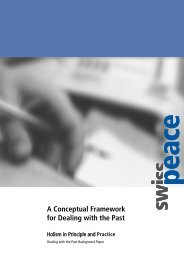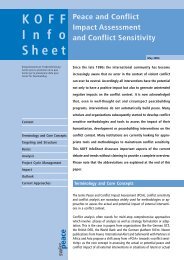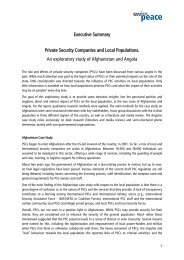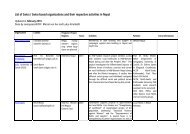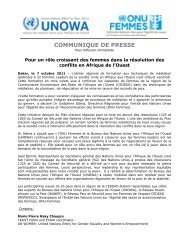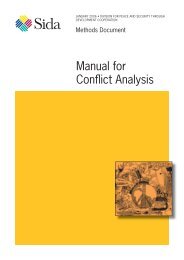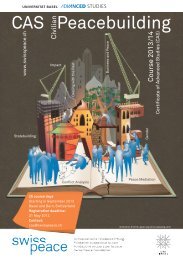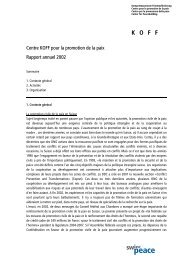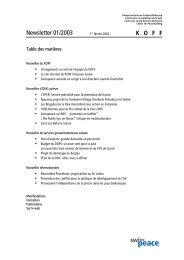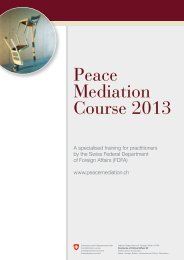Unpacking the Mystery of Mediation in African Peace ... - Swisspeace
Unpacking the Mystery of Mediation in African Peace ... - Swisspeace
Unpacking the Mystery of Mediation in African Peace ... - Swisspeace
Create successful ePaper yourself
Turn your PDF publications into a flip-book with our unique Google optimized e-Paper software.
Côte d’Ivoire, Ouagadougou Agreement<br />
Background <strong>of</strong> <strong>the</strong> Conflict<br />
Chronology<br />
The first signs <strong>of</strong> a crisis were registered at <strong>the</strong> beg<strong>in</strong>n<strong>in</strong>g<br />
<strong>of</strong> <strong>the</strong> 1990s. Latent conflicts became<br />
critical when <strong>the</strong> first president <strong>of</strong> Côte d’Ivoire,<br />
Félix Houphouët-Boigny, died <strong>in</strong> 1993. Economic<br />
decl<strong>in</strong>e was coupled with <strong>the</strong> political exploitation<br />
<strong>of</strong> an identity discourse around <strong>the</strong><br />
concept <strong>of</strong> “Ivoirité”. Henry Konan Bédié,<br />
Houphouët-Boigny’s successor, sharpened this<br />
nationalist discourse to exclude several candidates<br />
from <strong>the</strong> presidential elections <strong>in</strong> 1995 (Bédié<br />
won with about 95 per cent <strong>of</strong> <strong>the</strong> votes).<br />
After a coup <strong>in</strong> 1999 by General Robert Guéï,<br />
elections were held <strong>in</strong> 2000, <strong>in</strong> which <strong>the</strong> current<br />
president, Laurent Gbagbo, emerged as <strong>the</strong> w<strong>in</strong>ner.<br />
The tensions did not ease, however, and<br />
eventually led to <strong>the</strong> coup on 18 September<br />
2002, splitt<strong>in</strong>g <strong>the</strong> country <strong>in</strong>to a nor<strong>the</strong>rn part<br />
under <strong>the</strong> control <strong>of</strong> a coalition <strong>of</strong> armed nonstate<br />
actors, <strong>the</strong> Forces Nouvelles (FN), and a<br />
sou<strong>the</strong>rn part, <strong>in</strong>clud<strong>in</strong>g <strong>the</strong> country’s economic<br />
capital <strong>of</strong> Abidjan, over which <strong>the</strong> GoCI kept<br />
control. 62 The coalition <strong>of</strong> rebel groups comprised<br />
<strong>the</strong> MPCI, which had <strong>in</strong>stigated <strong>the</strong> 2002 coup<br />
attempt, and two groups operat<strong>in</strong>g exclusively <strong>in</strong><br />
<strong>the</strong> western part <strong>of</strong> <strong>the</strong> country (<strong>the</strong> MPIGO and<br />
<strong>the</strong> MJP). 63<br />
A French <strong>in</strong>tervention <strong>in</strong> 2003, codenamed<br />
Opération Licorne, prevented a military solution<br />
to <strong>the</strong> conflict and stopped <strong>the</strong> armed struggle at<br />
<strong>the</strong> very onset. Never<strong>the</strong>less, <strong>the</strong>re was massive<br />
displacement, especially <strong>in</strong> <strong>the</strong> western region <strong>of</strong><br />
Dix-Huit Montagnes. At <strong>the</strong> end <strong>of</strong> 2005, <strong>the</strong>re<br />
were around 700,000 IDPs. 64 The number <strong>of</strong><br />
casualties is disputed, but is generally assessed at<br />
around several hundred, mostly civilian, victims. 65<br />
62 Gramizzi, Claudio: “La Crise Ivoirienne”, Bruxelles: Les Rapports<br />
du GRIP (2003).<br />
63 For a detailed account <strong>of</strong> <strong>the</strong> dynamics <strong>in</strong> <strong>the</strong> Western part, see:<br />
International Crisis Group: “The War Is Not Yet Over”, <strong>in</strong>: Africa<br />
Report, no. 72 (28 November 2003),<br />
(http://www.crisisgroup.org/home/<strong>in</strong>dex.cfm?l=1&id=2389).<br />
64 For detailed <strong>in</strong>formation, see (http://www.<strong>in</strong>ternaldisplacement.org).<br />
65 See <strong>the</strong> “Rapport de la Commission d’enquête <strong>in</strong>ternationale<br />
sur les allégations de violations des droits de l’homme en Côte<br />
d’Ivoire” ( fr.wikisource.org).<br />
Causes <strong>of</strong> <strong>the</strong> Conflict<br />
The conflict is essentially political and identity related.<br />
Never<strong>the</strong>less, <strong>the</strong>re are a number <strong>of</strong> economic<br />
issues directly l<strong>in</strong>ked to questions <strong>of</strong> identity<br />
and citizenship, <strong>the</strong> most important be<strong>in</strong>g<br />
land ownership. 66 The policy <strong>of</strong> Houphouët-<br />
Boigny still practiced <strong>in</strong> some parts <strong>of</strong> <strong>the</strong> country<br />
was to grant ownership over land to any people<br />
cultivat<strong>in</strong>g it, provided <strong>the</strong> local chiefs’ agreement.<br />
67 This policy, along with Côte d’Ivoire’s<br />
prosperity dur<strong>in</strong>g <strong>the</strong> 1970s and 1980s due to<br />
high market prices for cacao, attracted many immigrants,<br />
ma<strong>in</strong>ly from Burk<strong>in</strong>a Faso.<br />
Dur<strong>in</strong>g <strong>the</strong> economic crisis, <strong>the</strong> identity discourse<br />
was used for two purposes: firstly, to frame immigrants<br />
as scapegoats for <strong>the</strong> lack <strong>of</strong> work places<br />
and decreas<strong>in</strong>g prices for agricultural products<br />
dur<strong>in</strong>g <strong>the</strong> 1990s. 68 Secondly, it served as a pretext<br />
to exclude Alassane Ouattara, who had served<br />
as prime m<strong>in</strong>ister under Houphouët-Boigny,<br />
from <strong>the</strong> election <strong>in</strong> 1995. This political dynamic<br />
led to <strong>the</strong> expatriation <strong>of</strong> some 100,000 people<br />
ma<strong>in</strong>ly from <strong>the</strong> nor<strong>the</strong>rn part, i.e., from <strong>the</strong> constituencies<br />
<strong>of</strong> Ouattara and his party. After com<strong>in</strong>g<br />
to power <strong>in</strong> 2000, Gbagbo did not effectively<br />
address <strong>the</strong>se issues or change <strong>the</strong> discrim<strong>in</strong>atory<br />
laws, which fuelled anger and mistrust.<br />
Despite <strong>the</strong> absolute majority <strong>of</strong> Muslims <strong>in</strong> <strong>the</strong><br />
North and Catholics <strong>in</strong> <strong>the</strong> South, <strong>the</strong> conflict<br />
was not ethniticized along religious or ethnic l<strong>in</strong>es. 69<br />
The discourse <strong>of</strong> “Ivoirité” was ra<strong>the</strong>r rejected altoge<strong>the</strong>r<br />
by <strong>the</strong> opposition and <strong>the</strong> FN, whose<br />
leadership represented both major religious groups.<br />
Côte d’Ivoire also benefited from an early ceasefire<br />
imposed by <strong>the</strong> French peacekeepers. In addition,<br />
<strong>the</strong> rebels’ political goals were clearly to be<br />
realized with<strong>in</strong> Côte d’Ivoire, i.e., <strong>the</strong>re was no<br />
66 De Gaudusson, Jean du Bois: “L’accord de Marcoussis”, <strong>in</strong>:<br />
Afrique contempora<strong>in</strong>e, 2003-2, no. 206 (2003)<br />
67 Ibid.; Author’s discussions with local land-owners <strong>in</strong> <strong>the</strong> 18<br />
Montagnes region.<br />
68 Forum Curdiphe: “L’ivoirité, ou l’esprit du nouveau contrat social<br />
du Président H. K. Bédié”, <strong>in</strong>: Politique Africa<strong>in</strong>e, no. 78<br />
(1996), pp. 65–9: “L’ivoirité est, selon nous, une exigence de<br />
souvera<strong>in</strong>eté, d’identité, de créativité. Le peuple ivoirien doit<br />
d’abord affirmer sa souvera<strong>in</strong>eté, son autorité face aux menaces<br />
de dépossession et d’assujettissement: qu’il s’agisse de l’immigration<br />
ou du pouvoir économique et politique.” (emphasis added).<br />
69 “Rôle central de l’immigration”, <strong>in</strong>: Le Monde Diplomatique<br />
(December 2007).<br />
35




